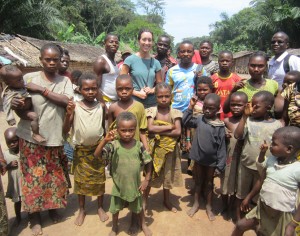
Ashley Styczynski (center) is pictured with residents of a rural village in the Democratic Republic of the Congo. She traveled to the region to discuss an upcoming study to protect against monkeypox.
The next time news of an infectious disease outbreak is grabbing headlines around the world, it might very well be a Bulldog on the ground trying to stem the tide of death and save thousands of lives.
Since July 2015, Ashley Styczynski (’07) has been a part of the Epidemic Intelligence Service (EIS) for the Center for Disease Control. Commonly referred to as “disease detectives,” EIS officers work across the United States and around the globe to keep Americans safe from a variety of health threats. Among other things, they are responsible for leading outbreak investigations, communicating important public health messages and publishing real-time recommendations.
“Public health is one of the most rewarding jobs there is, because you are helping people, not just one at a time, but hundreds or thousands at a time,” Styczynski said. “None of these changes happen overnight, or are accomplished by a single person, but I really feel like I can make some small difference in the world through the work I do as part of a team.”
In just her first few months as an EIS officer, Styczynski has visited Columbia and the Democratic Republic of the Congo to combat infectious disease. Her work in the Congo involves using the smallpox vaccine to prevent the spread of monkeypox, which is endemic in that region. She joined a team that already had four years of worked invested in the project.
“Public health progress is difficult and often slow,” Styczynski said. “This intervention will likely have a dramatic impact in DRC, but there are no quick fixes.”
Originally from the small town of Sterling, Ill., it might appear that Styczynski beat the odds to become one of only about 70 EIS officers working for the CDC, but her academic pedigree makes her well suited for the position. She took a year off of medical school to attain a Master of Public Health degree from Johns Hopkins. After earning her M.D. from the University of Illinois at Chicago, she completed internal medical residency training at George Washington University. However, it might be experiences during her time at the University that first placed her on her current career path.
“The most valuable aspects from my time at Truman that prepared me for life after college were the opportunities to be involved in research and to study abroad,” she said.
As an undergraduate, Styczynski participated in research labs with Truman faculty members. She conducted microbiology research with Michael Lockhart, as well as mammalogy research with Scott Burt.
“The microbiology research taught me lab techniques that greatly facilitated research I did with HIV during medical school,” she said. “My experience in mammalogy lab has been uniquely informative for the work I do now as part of the poxviruses and rabies branch at the CDC. The field trips we took to collect animal specimens for the mammology lab are very similar to some of the field activities I do in EIS to track poxvirus reservoirs in rodents.”
Opportunities away from the lab also helped shape Styczynski’s future. While she may be a seasoned world traveler now, she had never even been on an airplane until her first of two study abroad experiences at Truman. A summer course in South Africa to study the conservation and management techniques of large game animals inadvertently opened her eyes to another plight.
“When I wrote my essay about what I learned during the course, I couldn’t help but feel far more compelled to discuss what it was like to see people laying alongside the road, waiting to die from HIV/AIDS and its complications,” she said. “At that moment, I knew I wanted to focus my efforts on human health and decided to pursue a career in medicine.”
Not long after that, Styczynski enrolled in a semester-long course in Denmark for health practice and policy.
“This helped me to think more globally about solutions to health care problems in the U.S.,” Styczynski said. “By the time I entered medical school, I was primed to view medicine through a public health lens without yet knowing that was were I was headed.”
Working out of the CDC headquarters in Atlanta, Ga., Styczynski could be called upon to travel to the front lines of a health care crisis at a moment’s notice. While the nature of her work can be somber at times, she draws on yet another Truman experience to lighten the mood and sometimes make connections with locals — her time with the University Swingers.
“It’s now become a fun challenge for me to find swing dancing communities wherever I travel in the world,” she said. “Dancing can be a universal language.”

